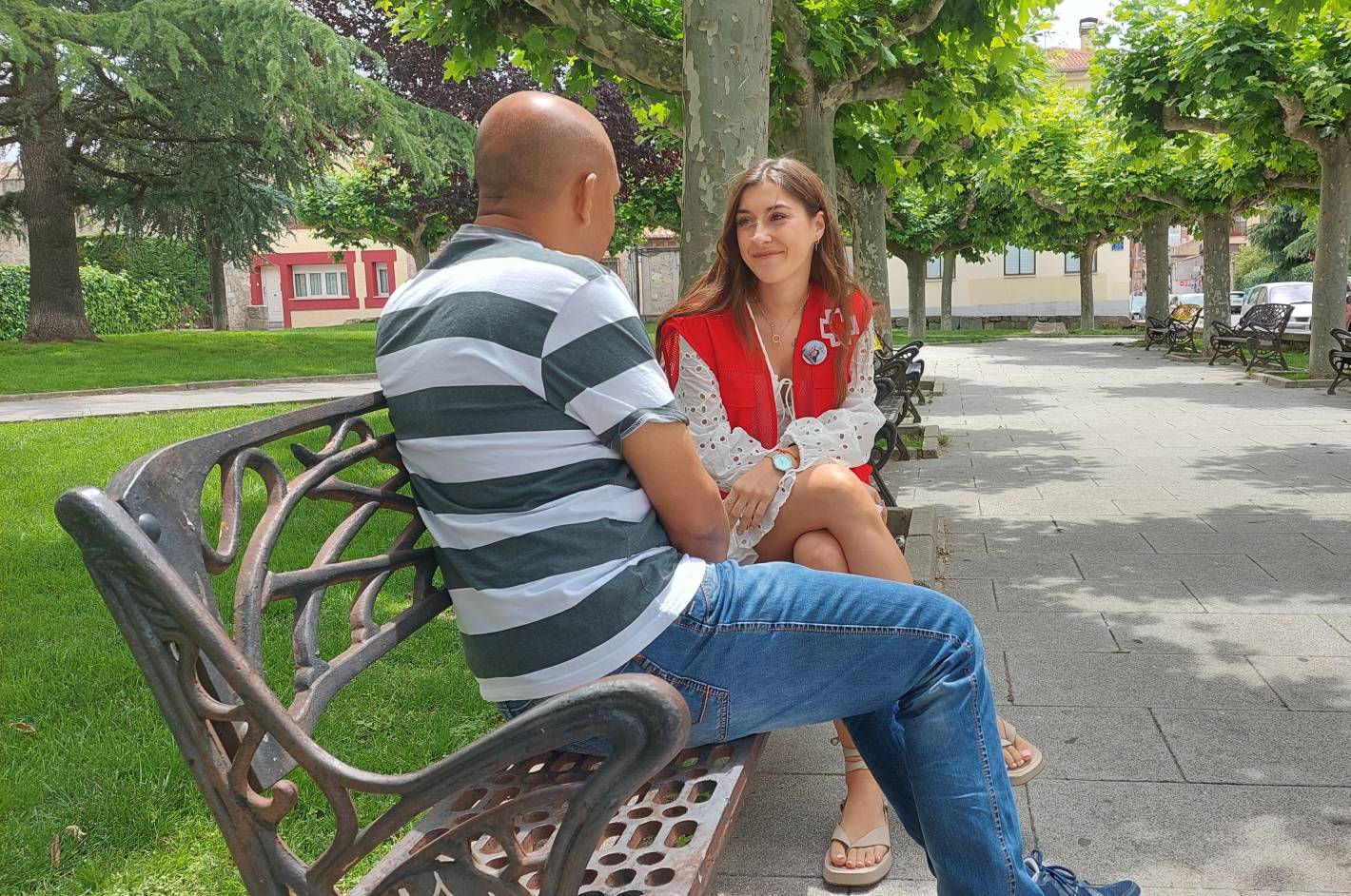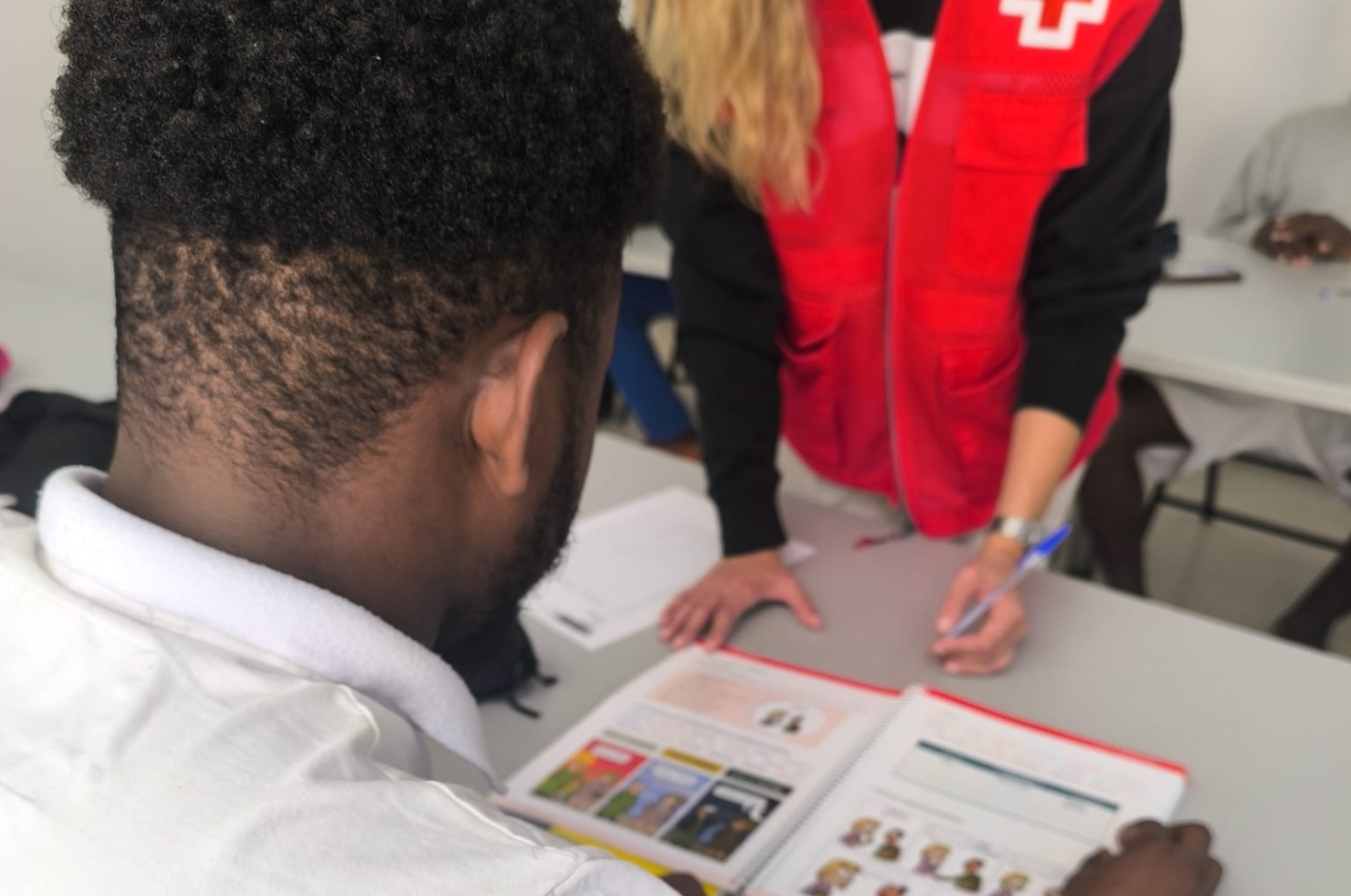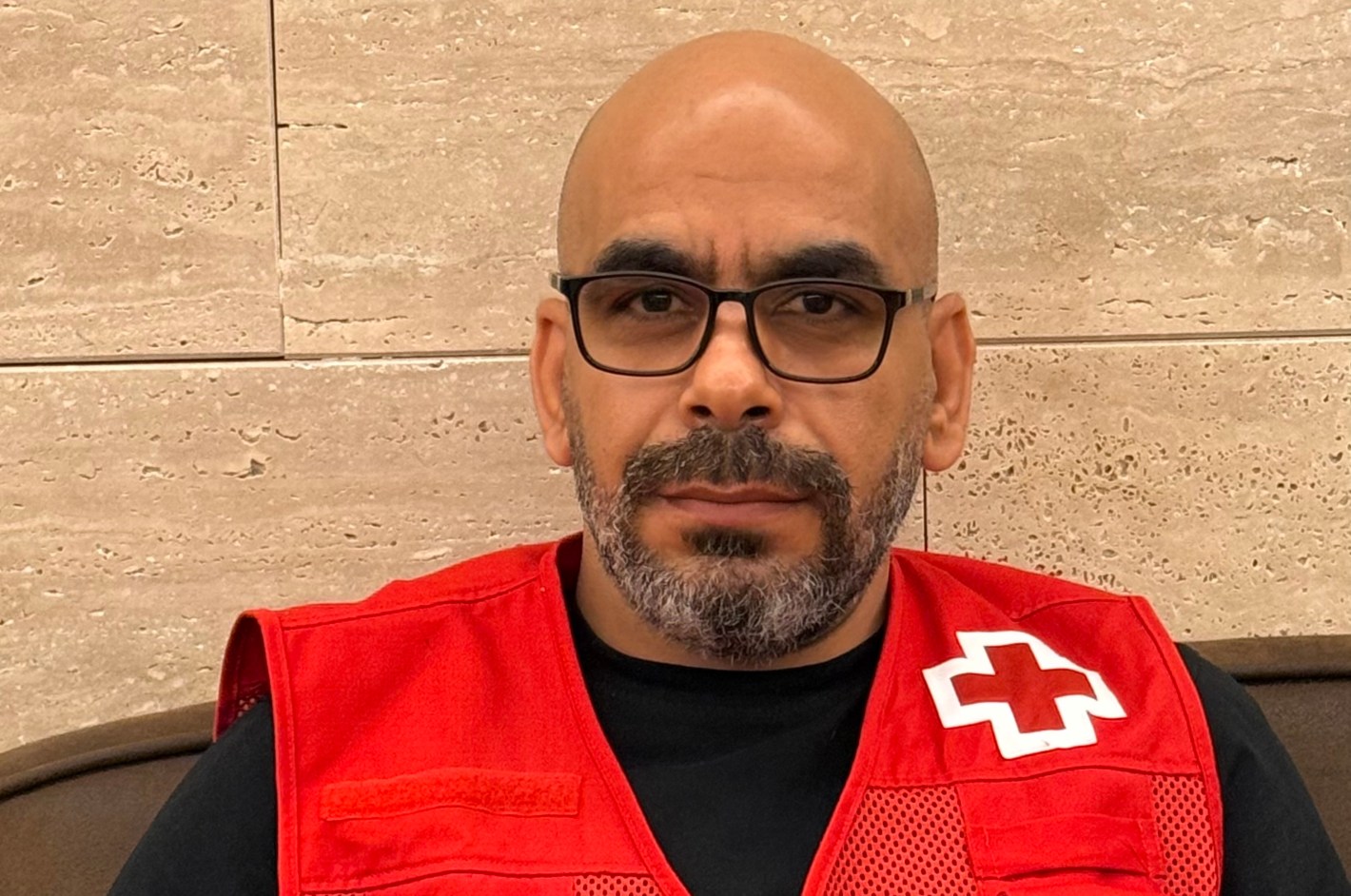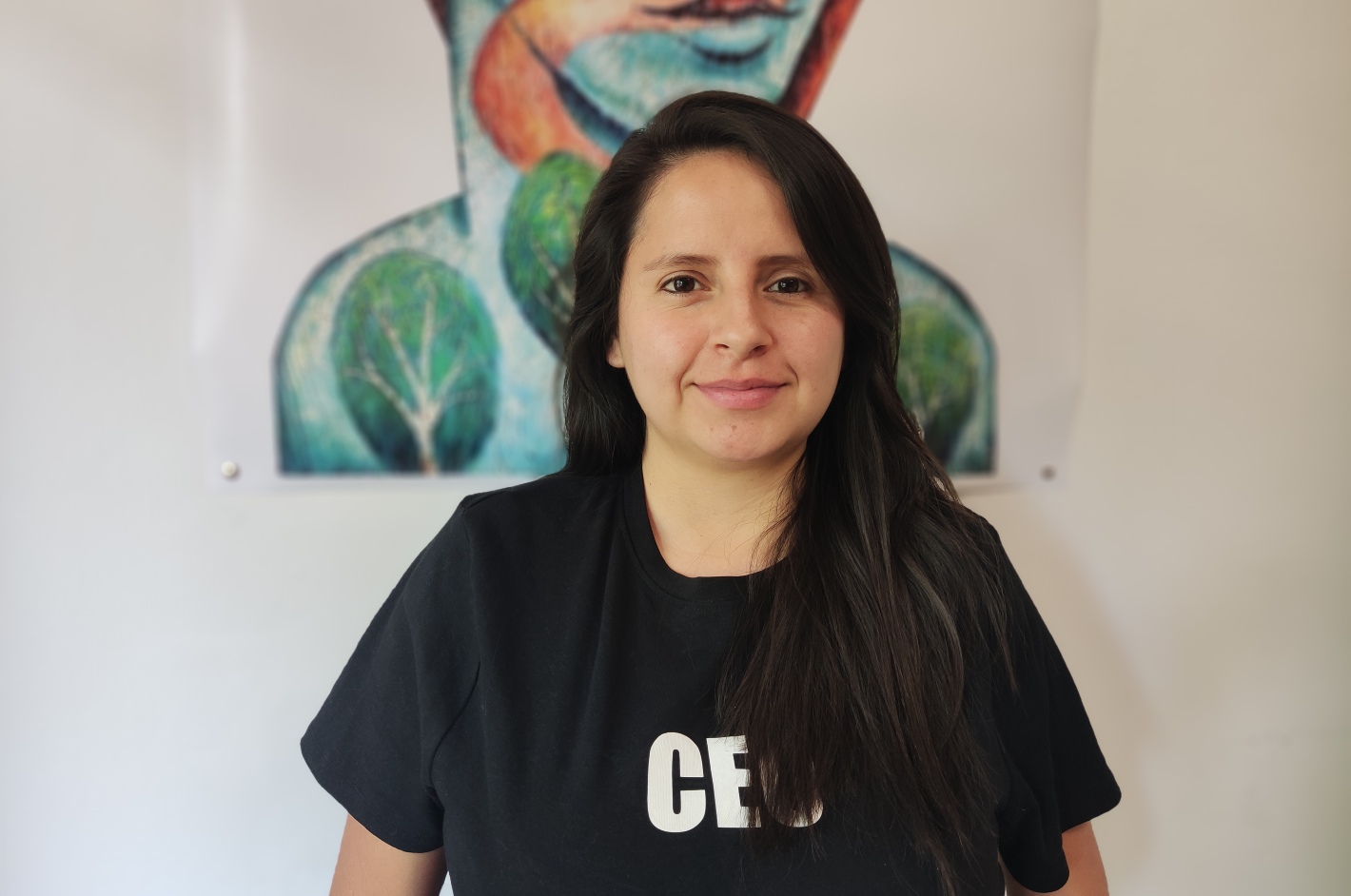Refuge means future - Ahora
Aplicaciones anidadas
Refuge means future
REFUGE MEANS FUTURE

Humanidad
Unidad
Contenidos
- Humanity above all: the work of the Red Cross
- Sara Mohamed Abuelgasim: when language is the key
- Abdul Hakim Albizat: from accountant in Syria to learning Catalan in Barcelona
- Tamara Kolomiets: repaying the help she received
- Basem Hamood Ahmed Al-Quhait: resilience in the face of adversity
- María Alejandra Torres Rivera: overcoming all barriers
- Security and dignity, the keys to prosperity
Cruz Roja

Banner Compártelo Reportaje Pequeño
parte 1 refugio futuro ingles 1
What would you take with you if you had to leave your home today? Millions of people around the world don't have to imagine the answer: they know it. They are asylum seekers, forced to flee their countries due to conflict, persecution, race, religion or nationality, membership of a particular social group or political opinion. 20 June marks World Refugee Day, which highlights the strength, courage and resilience of these people who, at the end of the day, are only looking for a better life. The date also raises awareness of the realities and difficulties they have overcome and promotes global solidarity and commitment.
Spain is one of the European countries that has most often used the verb "to welcome". The numbers prove it. From January to the end of December 2024, 167,366 applications for international protection were submitted in Spain, the highest number ever recorded in the country, with a predominance of nationalities from Latin American countries.
Seeking refuge is much more than crossing a border: it is starting over. And that is where the Spanish Red Cross, with the support of the Ministry of Inclusion, Social Security and Migrations, European Funds and the collaboration of various public administrations, plays a crucial role.

parte 2 dm refugiado 25 ingles
Humanity above all: the work of the Red Cross
The Spanish Red Cross has been working in the field of migrations for more than 30 years, firmly upholding its principle of humanity. In 2024, the organisation assisted 42,478 people seeking protection, of whom 56.97% were men and 43.03% were women. Although the Ukrainian population remains significant (21.15%), there has been a notable increase in the number of people from sub-Saharan Africa, especially Mali, who are young and have no support networks in Spain.
The majority of those assisted are between 18 and 34 years old (43.57%), followed by minors (21.66%), and a much smaller percentage of people over 65 (2.62%). In the field of employment, the Red Cross has provided assistance to 6,206 people seeking international protection, temporary protection or stateless persons, of whom 55% were women. Taking a personalised approach, it has facilitated access to guidance, training and qualification initiatives, including support in the recognition of qualifications and the continuation of studies.
Thanks to these actions, 32% of participants obtained a professional qualification and 38% found employment. This work has been sustained, in large part, thanks to collaboration with the business sector: in 2024, the Red Cross worked with 1,145 companies to generate job opportunities tailored to the profiles and needs of the people served.
Furthermore, during 2024, the Red Cross maintained 10,109 reception places in 47 provinces and supported the social inclusion process of 5,420 people during the preparation phase for autonomy. Thanks to this work, 15,042 people have received legal support in processing their applications for international protection and 13,181 have received psychological assistance to strengthen their emotional well-being. Taking into account the number of non-Spanish speakers in the programme, 9,062 people have gone through the language learning service at different levels of training, including literacy.
parte 3 dm refugiados 25 3 english
Sara Mohamed Abuelgasim: when language is the key
Originally from Khartoum (the capital of Sudan), Sara Mohamed Abuelgasim arrived in Spain fleeing the war, without knowing that this country would become her "new home". Upon her arrival in Madrid, everything seemed strange to her: "The language was a barrier, people were rushing around, life seemed noisy to me," she expresses in a heartfelt and emotional letter.
"I am neither Sudanese nor Spanish"
During the first few months, Sara could only think about her country of origin, filled with longing. It was not easy for her to swap kisra and molah, typical Sudanese dishes, for Spanish omelette and paella. She decided to start learning the language, and what initially caused her frustration ended up becoming a fundamental tool for settling in: "I began to find similarities between Spanish and Arabic: sugar, pillow, aubergine..." Building bridges between the two languages, she acknowledges, made her feel better.
Everything changed when she began to understand the jokes. "Language is not only communication, but also an open door to culture and emotions, a new sense of belonging," says Sara, who now lives in Albacete. After spending some time in our country, she feels she belongs to two worlds: "I am neither Sudanese nor Spanish."
parte 4 dm refugiados 25 4 english
Abdul Hakim Albizat: from accountant in Syria to learning Catalan in Barcelona
When Abdul Hakim Albizat arrived in Barcelona, he spent four months on the streets. "It was a very difficult situation because I didn't feel safe," confesses the 46-year-old Syrian economics and commerce graduate. After a lifetime working as an accountant in a hospital, he decided to pack his bags and seek asylum in Spain.
"People should not be afraid of refugees"
Referred to a reception centre in Masnou, Barcelona, Abdul soon visited all the schools in the area until he found one that would allow him to combine learning Spanish with Catalan. "I feel very supported and I have many friends, so I really enjoy going," he says, adding that he remembers all the people who helped him when he "had nothing". "This is very important to me because all my family and friends are in Syria," he emphasises.

As a beneficiary of the Red Cross International Protection programme, he currently lives in a reception centre in Calella (Barcelona) where he continues to study languages and has attended training courses to get his career back on track. "I am willing to learn about new areas of work or continue training in those I have already worked in," he says. His words of gratitude are directed towards the Red Cross, the Spanish government and the people. "People should not be afraid of refugees because life can change in an instant and anyone can become a refugee," he reflects.
parte 5 dm refugiados 25 5 english
Tamara Kolomiets: repaying the help she received
It was autumn 2022 when Tamara Kolomiets made the decision: she had to leave Ukraine. She had hidden in the basement of her house; she had slept in air-raid shelters; she had lived without electricity, water or heating. The fear she felt when she heard planes and missiles flying overhead, the fact that she was running out of the daily medication she needed, and the destruction of her home finally prompted her to take action. "I wrote a message to my friends and said, 'If we don't see each other again, I love you,'" she says.
"When the war in my country ends, I would like to return to Ukraine"
Spain seemed like a safe country to him, so he set off for here. He ended up in Malaga, where, as part of the Refugee Programme, he received legal advice, accompaniment to his medical appointments, social and psychological support, and employment guidance from the Red Cross. "I was able to overcome the stress of war and find my way at such a difficult time in my life," she says, "then I realised that I had enough strength to help other people, and that's when I started volunteering with the Red Cross."
Now Tamara helps other people who also come from Ukraine, guiding them and providing them with information about the resources available in Spain. She also participates in therapeutic leisure activities, such as "painting on canvas, planting trees and excursions around Andalusia." "When the war in my country ends, I would like to return to Ukraine as a Red Cross volunteer and support people in need using the experience I am gaining now," she concludes.
parte 6 dm refugiados 25 6 english
Basem Hamood Ahmed Al-Quhait: resilience in the face of adversity
Basem suffered persecution, ill-treatment and torture in Yemen. Two years ago, he arrived in Valencia as a beneficiary of Subsidiary Protection and since then he has been dealing with complex post-traumatic stress disorder and all the difficulties that this entails. Despite this, since joining the Programme for Applicants and Beneficiaries of International and Temporary Protection, he has been committed to his goals, learning the language and undertaking job training with the Red Cross in Valencia.
In December 2024, he began working as a farmer for a Valencian company, where he continues to work today, doing something that has made him feel "useful and fulfilled" and has given him a boost to improve his mental health. "Working and keeping my mind busy has helped me to stop thinking about and overcome my past experiences, as well as improving my Spanish and gaining a better understanding of how Spanish society works," he says. "Having a decent job will allow me to buy a home and have the financial resources to bring my wife and children over soon and offer them a decent life," he adds.
parte 7 dm refugiado 25 7 english
María Alejandra Torres Rivera: overcoming all barriers
"Brave." That's how María Alejandra defines herself, and with good reason: just over a year ago, she fled Colombia for gender-based reasons. Her hearing impairment has been an obstacle, but thanks to her great resilience, she is learning Spanish sign language, which is different from that of her native Colombia, at an association for deaf people.
"There, I only communicated with my family, and here I've had to work hard to speak better and also to understand people who aren't deaf. I've gained the ability to communicate because I've had no other choice," she confesses from Guadalajara, explaining that "job interviews over the phone are very difficult for me to understand and do well. It's a very frustrating and difficult feeling."
"I always like to learn more"
Even so, she has successfully completed her job training and started working, although she still maintains that these spaces need to be better adapted to people with disabilities. Who knows what the future holds: "I always like to learn more. I'm very curious to learn new things," admits María.

This is yet another example of how refugees always contribute and add value to society.
parte 8 dm refugiados 28 8 english
Security and dignity, the keys to prosperity
The Spanish Red Cross works to ensure that all people who are forced to flee their countries of origin enjoy safety, receive humane and dignified treatment, and have the support they need to thrive in inclusive societies. The aim is to ensure that migrants have access to humanitarian assistance and protection throughout their migration routes in a dignified and safe manner. To this end, the organisation contributes to their access to health services, psychosocial support, and water, sanitation and hygiene services, as well as facilitating migrants' ability to re-establish and maintain contact with their families.
In the countries where the Spanish Red Cross works, it also promotes the socio-economic inclusion of migrants alongside the communities that welcome them; communities that, in turn, benefit from their skills, experience and cultural diversity. In 2024, the number of migrants assisted by the organisation's International Cooperation department was 1,191,259.
With people at the centre of its humanitarian commitment, the Spanish Red Cross highlights the positive contribution of women and men seeking asylum in their countries of origin, transit and destination when their needs are met, their rights are protected and their social inclusion is supported.
Banner Compártelo Reportaje
a más gente, compártelo.
Banner Home


